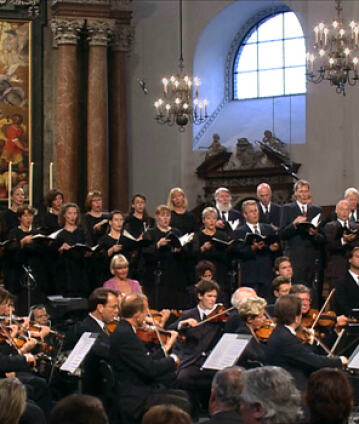Claudio Abbado conducts Mozart’s Requiem at Memorial Concert for Herbert von Karajan

In a newspaper interview, Claudio Abbado once said Herbert von Karajan had been “like a father” to him. So for Abbado it was not only a duty but also a matter of personal significance to conduct this memorial concert with the Berliner Philharmoniker at Salzburg Cathedral. The programme featured Wolfgang Amadeus Mozart’s Requiem.
Hardly any other work is surrounded by such a similar sense of mystery as Mozart’s Requiem. Firstly, because of the story of its composition. In the summer of 1791, a strange messenger came to Mozart requesting him to compose a requiem. Some later alleged that this messenger was to blame for Mozart’s early death – a mistake, because as we now know, the Requiem was commissioned by a harmless count whose eccentricities included passing off works by other composers as his own creations.
The mythical status of the Requiem was strengthened by the fact that Mozart died during its composition – we experience him here, as it were, on the threshold of the afterlife. The unusual character of the work may however be critical to its strong appeal. Throughout his life, Mozart had clearly separated his life and composition, his feelings and moods are expressed at best indirectly in his music. However, the Requiem seems to reflect his feelings, his fear of death, unfiltered – here, the revered composer becomes an approachable fellow human being.
Herbert von Karajan gave his later successor in Berlin a lot of valuable advice and also decisively furthered Abbado’s career by inviting him to appear at the Salzburg Festival in 1965. So it was not only a duty for Claudio Abbado to conduct this memorial concert, but also an honour.
© 1999 EuroArts Music International
Category
Artists
Our recommendations
- 2002 Europakonzert from Palermo with Claudio Abbado and Gil Shaham
- Claudio Abbado conducts Russian works at Suntory Hall in Tokyo
- Claudio Abbado conducts Mozart at the 1991 Europakonzert from Prague
- Claudio Abbado conducts works with a maritime theme at the 1998 Europakonzert from Stockholm
- 1994 Europakonzert from Meiningen with Claudio Abbado and Daniel Barenboim
- Daniel Barenboim and Plácido Domingo at the 1992 Europakonzert in the Escorial